What if I had 1,000 mg of caffeine? The Real Effects on Your Body
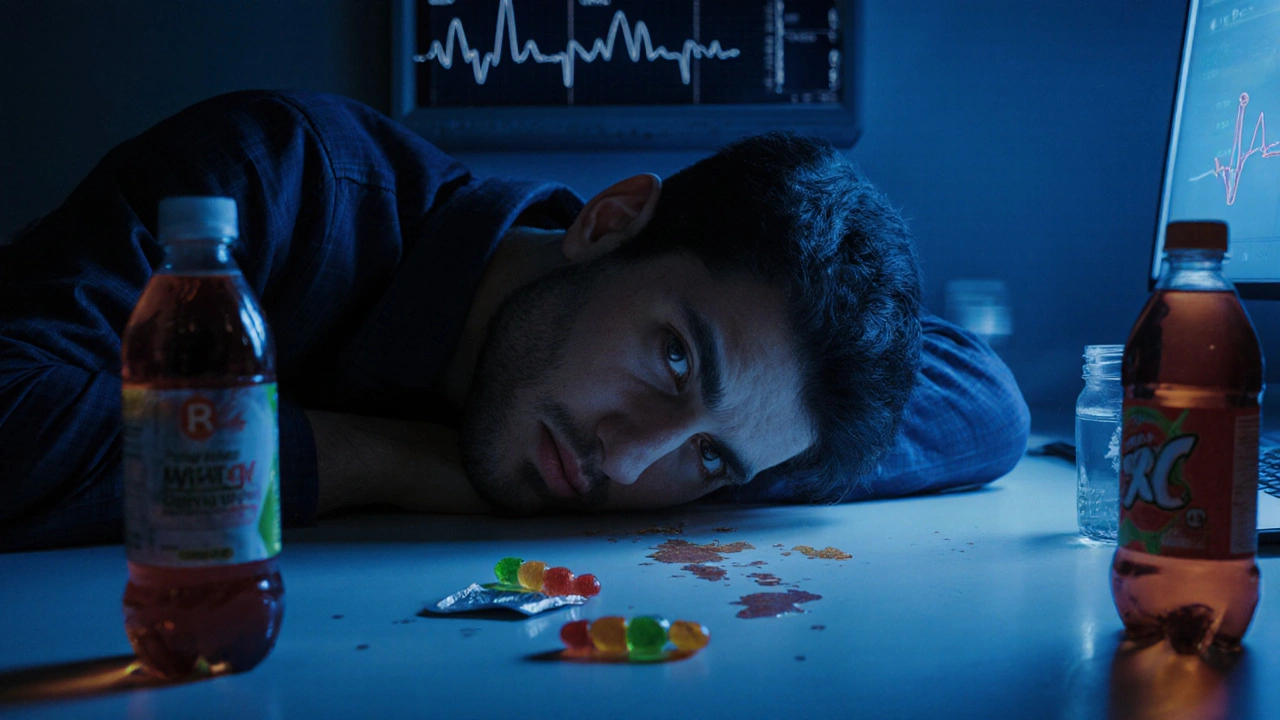
Imagine chugging a drink that packs 1,000 mg of caffeine. That’s not a joke. Some energy shots on the market claim to deliver over 500 mg per bottle. Multiply that, and you’re staring at a dose that’s more than double the FDA’s recommended daily limit. What happens when your body gets hit with that much caffeine? It’s not just about feeling wired. It’s about your heart racing, your nerves shaking, and your brain screaming for a reset.
Your heart doesn’t stand a chance
At 1,000 mg, caffeine becomes a potent stimulant that floods your bloodstream and slams into your cardiovascular system. Your heart rate doesn’t just go up-it can spike to 140 beats per minute or higher. That’s not normal. That’s not even close to normal. A 2023 study in the Journal of the American Heart Association tracked people who consumed over 800 mg of caffeine in one sitting. Nearly 60% showed abnormal heart rhythms within 30 minutes. Some needed emergency care. Your heart isn’t built to handle that kind of pressure. It’s like revving a car engine to redline for hours straight. Eventually, it breaks.
Your brain goes haywire
Caffeine blocks adenosine, the chemical that tells your brain it’s time to rest. At normal doses, that’s fine. At 1,000 mg, you’re not just blocking sleep-you’re hijacking your nervous system. You’ll feel jittery, anxious, maybe even paranoid. People report tunnel vision, ringing ears, and sudden panic attacks. One guy in Brisbane, a 28-year-old fitness trainer, tried a 1,000 mg caffeine gummy to "crush his workout". He ended up in the ER with chest tightness and trembling hands. He didn’t have a heart condition. He just thought more caffeine meant more energy. It didn’t. It meant his body was in survival mode.
You won’t sleep. Ever.
Caffeine has a half-life of about five hours. That means even after five hours, half of that 1,000 mg is still in your system. After ten hours? Still 250 mg. After 24 hours? You’re still carrying 60 mg-roughly the amount in a strong cup of coffee. Sleep becomes impossible. Not just hard. Impossible. Your brain can’t switch off. You’ll lie there for hours, heart pounding, thoughts racing, muscles twitching. And when you finally do drift off, your sleep quality is garbage. Deep sleep? Gone. REM sleep? Cut in half. You wake up exhausted, even after 8 hours in bed.
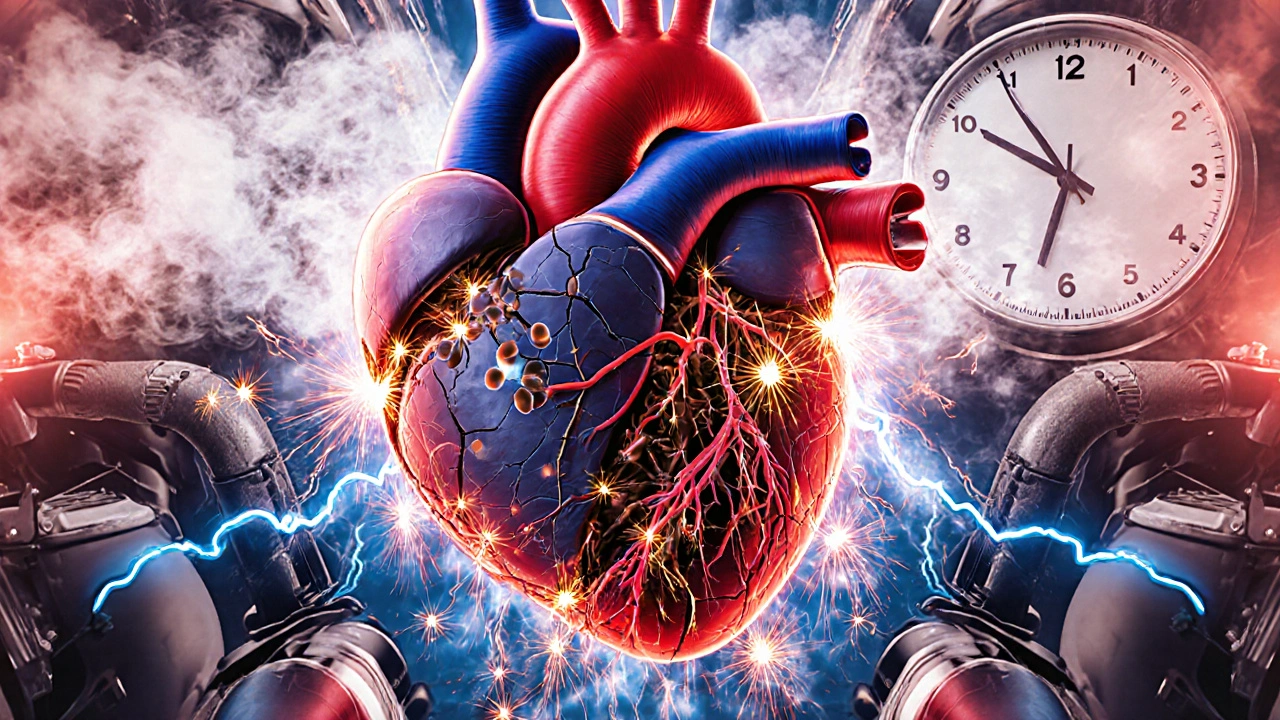
Dehydration hits fast
Caffeine is a diuretic. That means it tells your kidneys to flush out water. At 1,000 mg, you’re not just peeing more-you’re losing electrolytes faster than your body can replace them. You’ll feel dizzy. Your mouth will go dry. Your muscles will cramp. One study in the European Journal of Applied Physiology found that people who consumed 800+ mg of caffeine lost 20% more fluid through urine than those who didn’t. That’s not just thirst. That’s a chemical imbalance. And when your body’s low on fluids and electrolytes, your brain and muscles don’t work right. You’ll feel weak. Foggy. Nauseous.
It’s not about energy-it’s about panic
Most people think caffeine gives them energy. It doesn’t. It tricks your body into thinking it’s under stress. Your adrenal glands dump adrenaline. Your blood sugar spikes and crashes. You feel a rush, then a crash. At 1,000 mg, the rush is violent. The crash is brutal. You might feel like you’re on top of the world for an hour. Then, within two hours, you’re shaking, sweating, and wondering why your hands won’t stop trembling. That’s not energy. That’s your nervous system screaming for mercy.
Who’s actually doing this?
You’d think no one would be dumb enough to down 1,000 mg of caffeine. But people are. College kids trying to pull all-nighters. Bodybuilders chasing "pre-workout gains". Gamers staying up for 48-hour streaming marathons. Some energy drink brands market "extreme" blends with 400-500 mg per serving. Combine two, add a few espresso shots, and boom-you’re in dangerous territory. The FDA says 400 mg per day is safe for healthy adults. That’s four cups of coffee. 1,000 mg is 2.5 times that. And it’s not a matter of "building tolerance." Your body doesn’t adapt to poison. It just gets closer to breaking.
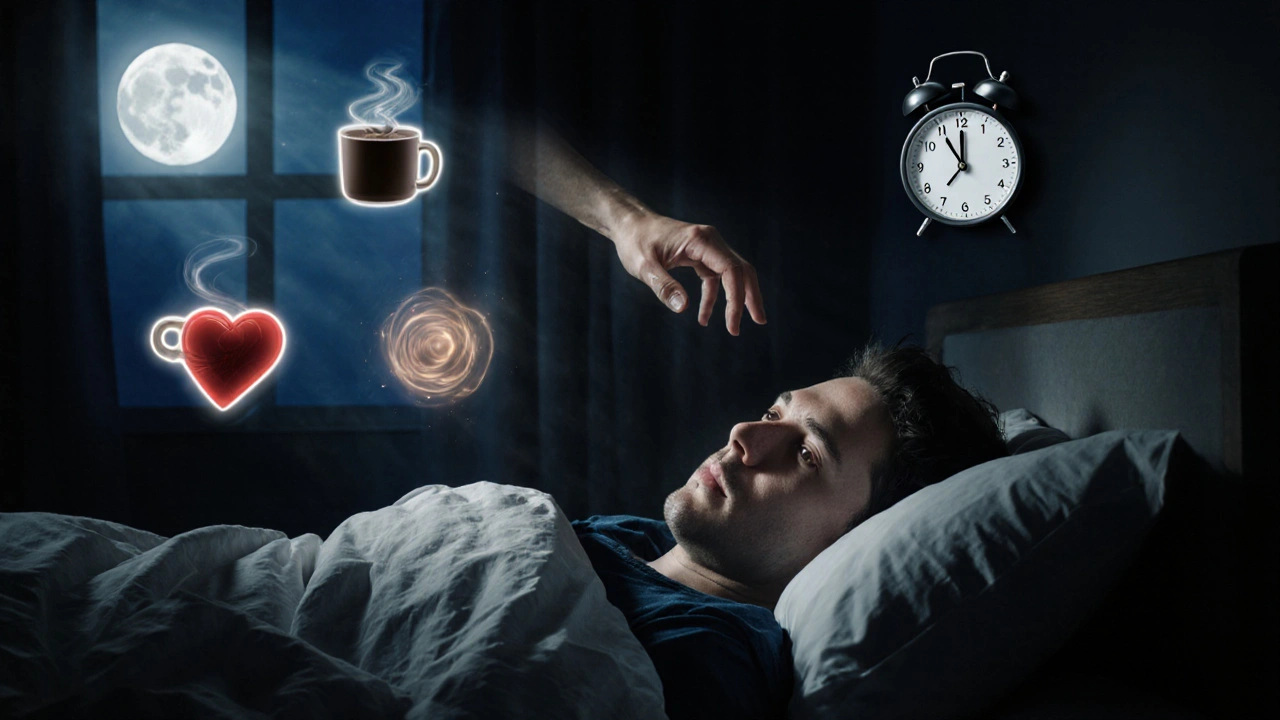
What happens if you take too much?
Overdose symptoms start at around 500 mg for sensitive people. At 1,000 mg, you’re in medical emergency territory. Symptoms include:
- Heart palpitations or irregular heartbeat
- Severe anxiety or panic attacks
- Vomiting or nausea
- High blood pressure
- Seizures (in extreme cases)
- Loss of consciousness
There have been at least five documented deaths in the U.S. since 2018 linked to caffeine overdose from energy drinks. All involved doses over 1,000 mg. One was a 19-year-old who mixed three energy drinks with a caffeine pill. Another was a 22-year-old who took a 1,200 mg supplement thinking it was a "legal steroid." Neither had underlying health issues. Just bad choices and misinformation.
There’s no safe way to do this
You might think, "I’m tough. I drink coffee all day." Doesn’t matter. Your liver doesn’t get better at processing caffeine. Your heart doesn’t get stronger from stress. Your nervous system doesn’t thank you for overloading it. Even if you’ve never had a problem before, this dose changes the game. One time. That’s all it takes. There’s no "I’ll be fine" with this. There’s only "I got lucky this time."
Real energy comes from sleep, hydration, movement, and food-not chemical firehoses. If you’re tired, rest. If you’re sluggish, eat something real. If you’re stressed, breathe. Caffeine isn’t a fix. It’s a bandage on a broken bone.
What should you do instead?
If you need more energy, try these instead:
- Get 7-8 hours of sleep-no compromises.
- Drink water first. Dehydration mimics fatigue.
- Take a 10-minute walk outside. Sunlight resets your circadian rhythm.
- Eat a snack with protein and complex carbs-nuts, yogurt, apple with peanut butter.
- If you need a boost, stick to 100-200 mg of caffeine max. One strong coffee. That’s it.
There’s no shortcut to real energy. And 1,000 mg of caffeine isn’t a power move. It’s a warning sign.



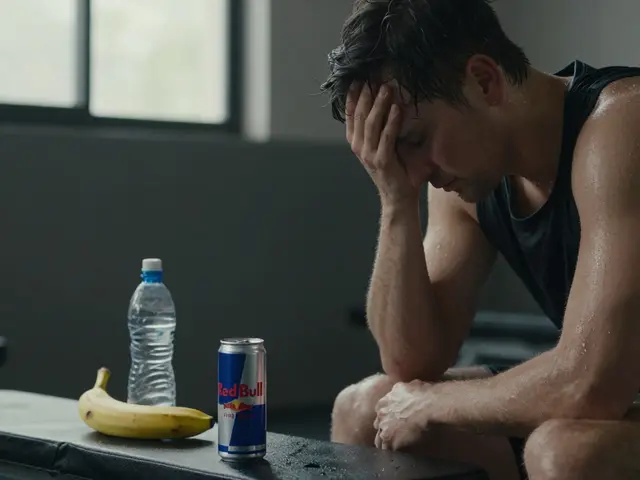

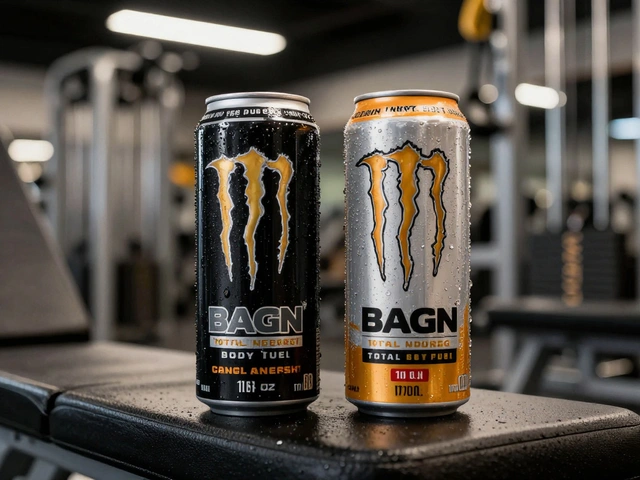
Comments (15)
Chris Heffron
28 Oct 2025
just had a cup of coffee and now i’m reading this like… oof 😅
Sandy Dog
28 Oct 2025
okay but like… imagine being a college kid and thinking ‘if 200mg gives me god mode, then 1000mg must be like becoming a superhero’ 🤪 i’ve seen people chug those ‘energy bombs’ like they’re soda at a party. one dude passed out in the library during finals week. no joke. they had to call security. he woke up three hours later sweating and whispering ‘why does my heart feel like it’s trying to escape my chest?’ 🫠
Nick Rios
28 Oct 2025
the part about your brain being hijacked really hit me. i used to think caffeine was just a ‘focus tool’ but after reading this, i realize it’s more like hacking your nervous system with a crowbar. your body isn’t designed to run on stress hormones all day. it’s like constantly revving your engine in neutral. eventually, the transmission blows. i’ve cut back to one coffee a day and honestly? my anxiety dropped. my sleep improved. i didn’t even realize how much i was running on fumes.
Amanda Harkins
30 Oct 2025
it’s wild how we’ve normalized this kind of self-harm. we don’t call it self-harm. we call it ‘hustle culture.’ you’re not lazy if you’re tired-you’re just not caffeinated enough. we’ve turned our bodies into machines that need constant fuel, and the fuel is pure chemical rage. i used to think i needed espresso before 8am to be human. now i know i just needed to stop pretending i’m a robot. your body isn’t a laptop you can reboot with a shot of espresso. it’s a living, breathing, fragile thing that deserves rest. not a chemical firehose.
Jeanie Watson
31 Oct 2025
meh. i’ve had 800mg before. lived to tell the tale. 🤷♀️
Donald Sullivan
31 Oct 2025
you’re telling me people don’t know this? who the hell is still doing this? if you’re dumb enough to chug 1000mg of caffeine, you probably also think ‘natural’ means ‘free from chemicals’ and that ‘organic’ means ‘safe.’ you’re not tough-you’re just reckless. and now you’re putting other people at risk because you think your body is special. it’s not.
Tina van Schelt
1 Nov 2025
it’s like watching someone try to outrun a tsunami by sprinting on a trampoline. you’re not ‘pushing limits’-you’re just playing russian roulette with your autonomic nervous system. i’ve seen too many young guys on reddit bragging about their ‘pre-workout stack’ like it’s a trophy. one guy posted a pic of himself holding three energy drinks and a caffeine pill like it was a power-up in a video game. he didn’t make it to the gym. he made it to the ER. and now he’s got a pacemaker. congrats, bro. you won the worst prize ever.
Andrew Nashaat
1 Nov 2025
the article says ‘1,000 mg is 2.5 times the FDA’s limit’-but that’s not technically accurate. the FDA recommends 400 mg per day for healthy adults, yes, but that’s not a ‘limit’-it’s a guideline. there’s no legal threshold. also, the study cited? It was observational, not controlled. And you mention ‘five documented deaths’-but did you factor in pre-existing conditions? Or drug interactions? Or alcohol? This reads like fearmongering dressed as science. Also-‘your liver doesn’t get better at processing caffeine’? That’s biologically false. Enzyme induction occurs with chronic exposure. You’re oversimplifying complex physiology to sell clicks.
Gina Grub
3 Nov 2025
adrenaline dump → sympathetic overdrive → catecholamine storm → cardiac arrhythmia risk ↑↑↑
the real issue isn’t caffeine-it’s the normalization of pharmacological self-abuse as ‘productivity.’
we’ve turned biological limits into personal failures.
you’re not tired-you’re broken.
and now you’re trying to fix it with a firehose.
Sandy Pan
5 Nov 2025
we live in a world where exhaustion is seen as a moral failing. if you’re tired, it’s because you didn’t drink enough chemicals. if you can’t focus, you didn’t take enough pills. if you can’t sleep, you didn’t push hard enough. but your body isn’t a machine you can overclock. it’s a living system that needs rhythm, not rage. caffeine doesn’t give you energy-it steals it from your future self. and one day, your future self will come knocking with a hospital bill and a pacemaker.
Eric Etienne
6 Nov 2025
so you’re telling me the guy who chugs 4 energy drinks before a gaming marathon is the problem? bro. he’s not the problem. the companies selling 500mg shots are. they don’t even label it right. you think people know what they’re swallowing? no. they think it’s ‘just a drink.’ it’s not. it’s a chemical landmine. and the FDA is asleep at the wheel.
Dylan Rodriquez
6 Nov 2025
i just want to say thank you for writing this. i used to be the person who thought caffeine was a superpower. i’d drink two espressos before work, then a ‘pre-workout’ before the gym, then another one to stay up for a project. i thought i was being productive. turns out i was just running on borrowed time. after reading this, i switched to tea. then just water. then-get this-I started going to bed at 11pm. and you know what? i have more energy. not because of chemicals. because i let my body rest. you don’t need more caffeine. you need more sleep. it’s not sexy. but it works.
Amanda Ablan
7 Nov 2025
if you’re reading this and you’re someone who’s tried this-please know you’re not alone. i did it too. i thought i was ‘grinding.’ turns out i was just numbing myself. the real fix isn’t more caffeine-it’s learning to sit with boredom. to rest without guilt. to say ‘i’m tired’ and mean it. your worth isn’t measured in productivity. it’s measured in how well you take care of yourself. i’m not perfect. but i stopped drinking energy drinks. and i sleep like a baby now.
Meredith Howard
9 Nov 2025
the physiological mechanisms of adenosine receptor antagonism and catecholamine release are well documented in peer-reviewed literature. however, the anecdotal framing in this article may overgeneralize population-level risks. individual metabolic variance in CYP1A2 enzyme activity significantly influences caffeine sensitivity. some individuals can metabolize 1000 mg without acute adverse effects. while caution is warranted, blanket statements may misinform those with high tolerance. further, regulatory oversight of dietary supplements remains fragmented. perhaps the focus should be on labeling transparency rather than moralizing consumption.
Kevin Hagerty
9 Nov 2025
so you’re telling me people are dumb enough to do this? wow. i thought we were past this. next they’ll be snorting sugar to stay awake. honestly if you’re that tired you should just quit your job and go live in a cave. or better yet-stop pretending you’re a machine. you’re not Elon Musk. you’re just someone who can’t handle 8 hours of sleep. congrats on your caffeine overdose. you win the award for worst life choices of 2025